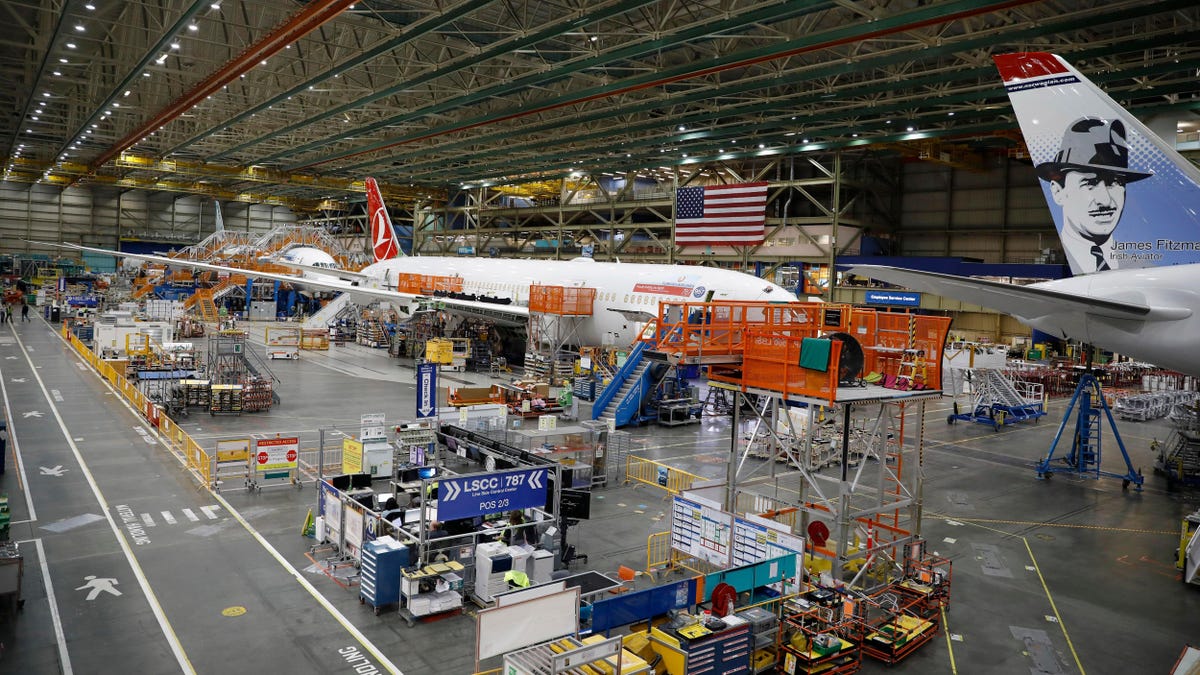The Air Travel Industry Is Facing a Shortage of Workers to Make Airplane Parts

A Boeing 787 airplane on the production line at a Boeing factory in Washington, D.C.Photo: Liu Guanguan (Getty Images)
The air travel industry has rebounded to pre-pandemic levels, but a shortage of workers at plane part factories could threaten the industry’s growth. Airplane parts production in Canada and the U.S. is falling behind due to a lack of skilled workers, according to Reuters, which is forcing companies like Boeing, Airbus and Raytheon to delay the production of aircraft.
Just as plane companies were anticipating a boost in production and hoping for a reprieve after a two-year slump during the global pandemic, part suppliers throughout North America are facing a worker shortage. American companies like Precision Castparts Corp. and Howmet Aerospace are trying to recover the staff they had to slash two years ago. And Canadian supplier Mitchell Aerospace expects their own shortage to slow down plane production for a year or more.
Photo: Christian Charisius (Getty Images)
The company is struggling to hire workers who can make cast parts used in landing gear and engine components. These are skilled workers in the casting industry who take time to train and are not easily replaced by automated systems. Robots won’t be taking (most of) these jobs any time soon.
And yet there aren’t enough of them to even fill a second shift, which would have started casting work in the Montreal factory at some point in the afternoon as the first shift left.
G/O Media may get a commission
60% off
Jachs NY Fall Sale 60% Off
Styles starting at $29
Layer up with Jachs NY’s fall sale—60% off fall styles. Shirts start at $29, and with the promo code, you can curate a whole layered look.
The issue is that Mitchell cut a large portion of its workers during the pandemic, and this is putting pressure on those workers left, who are trying to fill orders reaching pre-pandemic volumes. Once again, the amount of people doing the work hasn’t changed, while the amount of work is changing too quickly.
The airline and trucking industries are having the same problem, which comes down to few workers doing the work that requires a larger workforce. Combine that with current inflation and worker pay not increasing much over the last few years and you have a big issue. Then, heap on the latest boom in air travel, and the house of cards could blow away.
Mitchell hopes to incentivize workers by offering overtime and raising wages by 4.75 percent. The privately-held company is giving referral bonuses and making an effort to hire more women, immigrants and even refugees from Ukraine.
But the company and many other aircraft suppliers can hardly keep pace with current orders from major plane makers. They keep having to push back delivery timelines, which in turn, delays plane maker’s production schedules.
In the U.S., aerospace employment is at 8.4 percent below what it used to be before the pandemic, as Reuters reports. In one Canadian province alone, the industry will need 38,000 more workers to keep up with demand within the next decade. The president of Mitchell described the frenzied pace of work and compared it to a hurricane hitting the plant. And without thousands of new workers, it looks like the industry is going to struggle to weather the storm.
Photo: Stephen Brashear (Getty Images)



